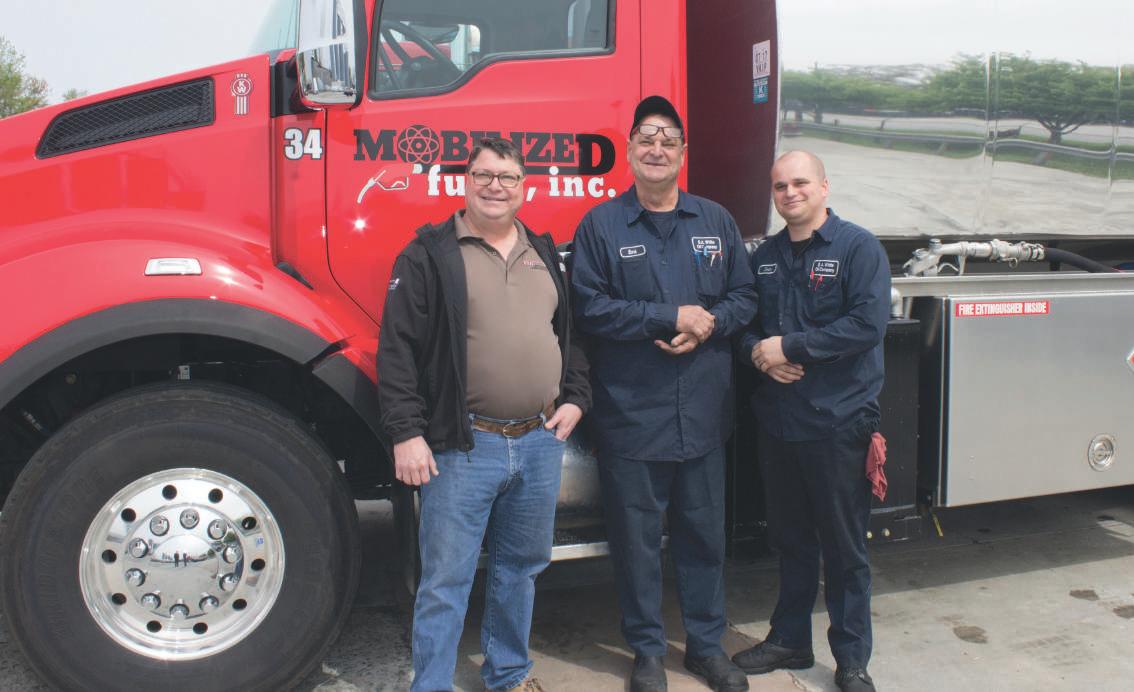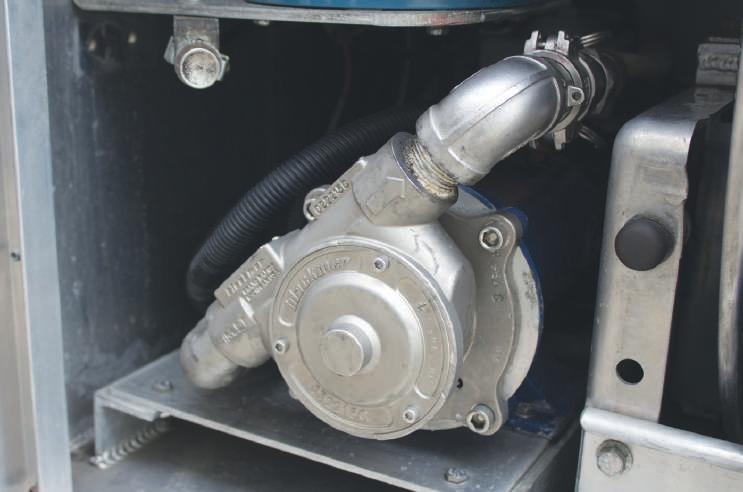
6 minute read
Blackmer pumps help DEF delivery
EVER READY
PUMPS • THE PARTICULAR DEMANDS OF HANDLING DEF, ESPECIALLY IN LARGE VOLUMES, CALL FOR A TRANSFER SOLUTION THAT CAN ENSURE THE OPERATOR CONSISTENT UPTIME
DIESEL EXHAUST FLUID (DEF) is a daily necessity for hauliers and transport companies. But delivering DEF can be very challenging; it needs to be handled by equipment and transports specially designed for the purpose. DEF is incompatible with materials such as copper and brass and can lead to corrosion of these materials. This means that any transport used to haul DEF, as well as its wetted components, needs to be made of stainless steel or approved plastics. This ensures the fluid does not become contaminated during its handling and transfer. By extension, the pumps required to load DEF onto the transport and off again into a storage vessel or truck, must also be compatible with DEF’s unique characteristics.
However, not all DEF-compatible pumps are created equal. Many DEF pumps can be categorised as low-cost, short-service ‘throwaway’ pumps, which use inadequate designs and, in many cases, are constructed of cheaper plastics materials. Improper pump design can cause the equipment to lock up, shut down or leak, resulting in costly downtime or a messy cleanup.
This is a lesson that Earl and ‘Little Man’ Evan Noble – the father and son team that keep trucks running for SA White Oil Company (above) - had to find out the hard way. Prior to finding their current pump solution, the two were using a brand name 12-volt transfer pump to deliver DEF. While the pumps are suitable for DEF applications, they can be extremely noisy, and their design and method of operation can cause the pump to shut down and overheat when used continuously. In addition, the pumps usually cannot provide the flow rates most DEF haulers need.
“Before, we were using whatever pump fit our application because we just didn’t know that there was a better quality pump out there,” says Earl Noble. “The pumps we originally installed seemed to work fine for the smaller tanks when they didn’t have to pump that much. But when it came time to make more consistent deliveries, the pumps couldn’t handle that much pumping. If we ran the pumps too long, the 12-volt motor on the pumps would overheat and not turn back on until they were cooled down, especially in the summertime when it was hot. These are time-sensitive deliveries and our drivers can’t be waiting for the pumps to cool down or be replaced.”
FINDING A SOLUTION In addition to material compatibility, another important consideration is pump reliability
and longevity. Pumps that use parts that are not as robust as the industry standard are more likely to wear out or break down faster. When these operational problems occur, the result is higher costs for maintenance, repair, replacement parts and, in the worstcase scenario, the purchase of a new pump. The hidden cost in these situations is the downtime incurred as a truck sits idle. And an offshoot of the downtime that can stall the delivery schedule is something that can be just as costly for the delivery company: a loss of reputation.
“We were going through three or four pumps a year on each truck,” says Earl Noble. “It’s frustrating when we have the product but we can’t deliver it because a pump broke down. It not only makes our company look bad, but it makes Little Man and me look bad because we’re the ones maintaining the trucks. So with me, it’s three strikes and you’re out. When a pump shuts off or breaks down a few times, I just want to take it off and replace it. So, when the pumps we were using hit three strikes, it was time to find something more reliable.”
To help find this solution, the pair turned to Werts Welding & Tank Service of Doraville, Georgia, a distributor of tank-trailer parts and equipment. Specifically, the father-son team contacted Elliot Noble for a pump recommendation. In addition to being the branch manager at Werts Welding, Elliot is Earl’s brother.
“My brother called me and said he was looking for a more reliable pump,” says Elliot Noble. “I could tell he was frustrated and just couldn’t take the breakdowns anymore. I knew I had to find him the best possible solution.
“I told Earl and Evan to go with a Blackmer because it provides them with the correct flow rates and pressures, and it’s able to clear the tank lines quickly, which speeds up the delivery time for the drivers,” Elliot Noble explains. “And best of all, they are reliable. With the Blackmer, it’s all about constant pumping. You never have to worry about the pump shutting down, and they are not affected by the weather. Hot or cold, they just keep on pumping.”
PUMPS IN DETAIL Blackmer SX1B-DEF Series sliding vane pumps have been specifically designed to meet the strict handling requirements of DEF; all of the pump’s materials are either DEF-approved or have been tested to ensure there is no fluid contamination or leeching. This allows the pumps to meet the ISO 22241-3 material standards and cleanliness specifications required for DEF-handling applications. With a small, compact design, SX1BDEF Series pumps are ideal for truck mounting and for use in fleet refuelling or tote applications. What further differentiates the SX1B-DEF model from competitive models is a choice of 12-volt and 110-volt motor options. The 110-volt version is available with a 50- and 60-Hz dual-rated motor.
An additional unique feature of the SX1BDEF pump is the incorporation of a 316 stainless steel motor shaft as the pump shaft. Other features include C-face pump mounting, commercial mechanical seal, and 1” NPT or 1” BSPP tapped-port options. SX1B-DEF pumps offer a flow rates up to 10 gpm (37.9 l/min) with differential pressures to 25 psi (1.7 bar) and motor speed capabilities up to 1,750 rpm. Operating within those parameters, SA White’s DEF tanks can be offloaded in as little as 15 minutes.
The reliability of the SX1B-DEF pump can be attributed to pump’s easily maintained and replaceable Duravanes® that self-adjust for wear in order to maintain flow rate, while minimising shear and agitation. An internal relief valve protects the pump from excessive pressures. The pump also has excellent self-priming and dry-run capabilities and maintenance is reduced because internal wear is almost completely limited to the easily replaced sliding vanes, which can be accomplished without needing to take the pump out of line.
ABOUT THE BRAND SA White Oil, a third generation family-owned company founded in 1926 and still located at its original headquarters in Marietta, Georgia, operates 25 fuel tankers within a 150-mile (240-km) radius of Atlanta. Along with its sister company Mobilized Fuels, it uses four refuelling trucks that provide fleet-fuel deliveries of both diesel and DEF; they handle more than 5,000 gal (19,000 litres) of DEF each week. HCB
SWITCHING TO BLACKMER PUMPS (BELOW) HAS HELPED THE
NOBLE FAMILY AND SA WHITE TO ENSURE MORE RELIABLE
DEF DELIVERIES WITH LESS MAINTENANCE NEEDED

This is an edited version of an article by Geoff VanLeeuwen, product management director for Blackmer, a product brand of PSG, a Dover company. For more information, visit www.blackmer.com or www.psgdover.com.


